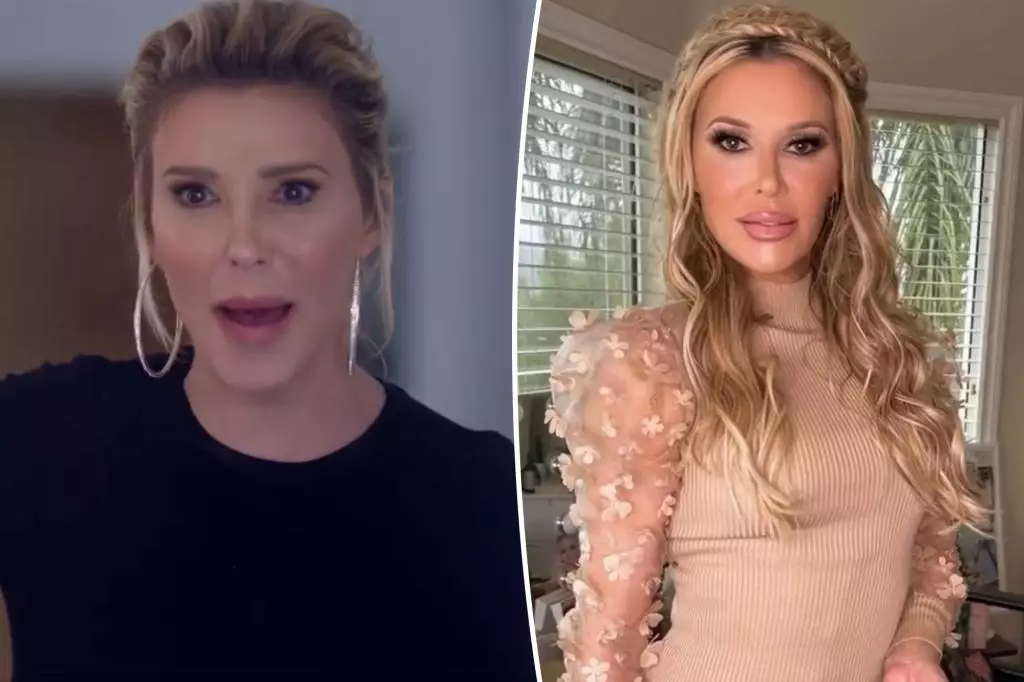Brandi Glanville, known for her often fiery personality on “The Real Housewives of Beverly Hills,” is currently embroiled in a notable legal battle that raises questions about power dynamics, workplace ethics, and the responsibilities of reality television networks. The drama unfolded when Glanville publicly accused Andy Cohen, a prominent figure in Bravo’s programming, of sexual harassment. In a shocking twist, her legal counsel recently severed ties with her, stating that her claims lacked merit. This article seeks to dissect the intricacies of Glanville’s allegations, the fallout from her accusations, and the broader implications for the entertainment industry.
At the heart of this controversy is a letter sent by Glanville’s former lawyers to major industry players such as NBC and Warner Bros. The document accused Andy Cohen of making inappropriate sexual advances through a video sent to Glanville in 2022. Specific allegations include Cohen suggesting he wanted to “sleep with another Bravo star” while thinking about Glanville, and even inviting her to watch him engage in sexual acts via FaceTime when he was purportedly intoxicated.
The gravity of these claims cannot be understated, as they imply a severe abuse of power by someone in Cohen’s position, who has significant influence over his colleagues’ careers. This situation echoes past scandals in journalism and entertainment, where powerful figures exploited their status to engage in inappropriate behavior, prioritizing profit over the well-being of individuals involved.
In a baffling development, Glanville’s lawyers announced their decision to withdraw from the case, contradicting their earlier assurances of the strength of her claims. In a post on social media, Glanville expressed her disbelief, suggesting that perhaps her counsel had been compromised, implying they might be “paid off.” The timing of this withdrawal raises suspicion and invites speculation regarding the pressures that legal professionals may face from powerful entities like Bravo and Cohen.
While Glanville’s lawyers, Bryan Freedman and Mark Geragos, have not publicly explained their reasons for stepping back, such actions underscore the complexities and potential vulnerabilities faced by individuals bringing forward claims against corporate giants. This dynamic contributes to a culture of silence that often deters victims from speaking out, fearing both legal repercussions and professional ostracism.
After the allegations came to light, Andy Cohen addressed the issue, dismissing the accusations as stemming from an “inappropriate joke” made in the video with Glanville and fellow reality star Kate Chastain. Cohen attempted to frame the incident as lighthearted banter, asserting that Glanville was in on the joke. While acknowledging that the comment was out of bounds, his framing of the event draws attention to the problematic nature of humor in professional settings, particularly when it can be misconstrued or taken out of context.
Cohen’s defense strategy poses significant implications for the conversation around workplace behavior in the entertainment industry. His apology brims with an aura of dismissal, suggesting that such incidents could easily be swept away under the guise of humor, undermining the seriousness of Glanville’s allegations.
As details of this controversy continue to unfold, the case has ignited discussions around not only the responsibility of networks like Bravo but also their accountability in dealing with allegations of misconduct. Glanville’s discontent with Bravo also points to a growing trend among former reality stars, who have begun to speak out against what they perceive as toxic workplace environments.
Additional allegations against other individuals associated with the network, including Caroline Manzo, further complicate the narrative surrounding Bravo and its treatment of employees. As lawsuits and accusations emerge, the potential for a significant shift in how reality television addresses such claims is apparent.
The ongoing saga of Brandi Glanville and her accusations against Andy Cohen serves as a crucial reminder of the complexities involved in power relationships within the entertainment industry. As discourse around harassment and misconduct evolves, it is imperative that victims feel empowered to share their experiences without fear of repercussion. The outcome of this case will undoubtedly have lasting repercussions—not only for those involved but also for the standards of accountability within the realm of reality television. As viewers and fans, it’s essential to foster a culture of support that prioritizes the dignity and safety of all individuals, transcending the glitzy façade of the entertainment world.

Leave a Reply